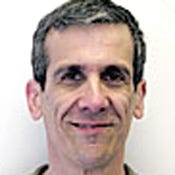Mission: TransformationMission: Transformation
Unisys CEO Weinbach changed the company into a service provider

When he joined Unisys Corp. in late 1997, chairman and CEO Larry Weinbach promised to transform the company from a provider of hardware and software to a technology-enabled services company. Considering Unisys' mainframe roots, that was no simple mission. Yet Weinbach, who came to Unisys with a resumé that included nine years building Andersen Worldwide's professional-services business, has delivered on his promise.
Today, 80% of the company's revenue comes from services, including outsourcing. Services-related revenue grew 10% in the fourth quarter of 2003. "Unisys is very good at mission-critical processing," Weinbach says. "That's our forte."
Weinbach has identified information security as a growth area for UnisysPhoto by Bill Cramer |
Weinbach undertook this transformation during a period of boom-and-bust for the IT industry. Arriving at Unisys at the cusp of the dot-com expansion, he saw the company through the subsequent economic downturn and last year's revival, when Unisys reported $5.9 billion in revenue, up from $5.6 billion in 2002. Earnings last year were $259 million, up from $223 million the previous year.
For Unisys, outsourcing means business-process outsourcing, not traditional IT services outsourcing. IT services, Weinbach says, have become a commodity business dominated by the likes of Computer Sciences, IBM, and EDS. Business-process outsourcing affords Unisys the opportunity to compete in core areas of strength, such as the financial-services and health-care sectors.
Weinbach's professional-services savvy was in evidence last year when he launched a "business blueprinting" service that helps executives understand interactions between IT and business objectives. Business blueprinting helps customers see cause-and-effect relationships better, Weinbach says.
Check processing is a core source of Unisys' outsourcing revenue. Half of all checks written in the world are processed on Unisys systems. In the United States, the recently enacted Check 21 law, which permits banks to transmit images of checks instead of the originals, is causing banks to study their check technology infrastructures with an eye toward beefing up their imaging capabilities. "Financial institutions are putting together their business cases" on Check 21, Weinbach says.
Financial institutions will hike technology spending by 4% to 6% this year, Weinbach predicts. They're embarking on IT projects for image-based processing; consolidating silos across various payments-related businesses such as checks, credit cards, and mortgages; enhancing customer service with Web services; and attempting to comply with Basel II, Sarbanes-Oxley, the USA Patriot Act, and other legislation, he says.
Unisys bagged one of the largest financial institutions, Washington Mutual, at the end of 2002 in a contract to capture images of checks at branches rather than the bank sending them to off-site facilities, generating hefty savings in transportation costs and facilitating compliance with Check 21. Under a seven-year business-process outsourcing contract worth $500 million, Unisys is installing image-capture devices at each branch. Unisys also will run Washington Mutual's regional processing centers across the country.
In England, which has a highly centralized banking system, Unisys owns a majority interest in Intelligent Processing Solutions Ltd., a provider of check-processing services. In October, Unisys inked a 10-year contract with HBOS plc under which Intelligent Processing will manage most of HBOS's check-clearing operations.
Another core customer segment for Unisys is the health-care industry--especially government health-care systems. Unisys manages health-care systems in five states, processing more than $21 billion in payments. It's under contract with the Department of Defense's Military Health System to provide information-security consulting and services to ensure that the system complies with the department's Information Technology Security Certification and Accreditation Process, which addresses the security and privacy of patient information. Last month, the Defense Department expanded its contract with Unisys to cover 220 U.S. locations, up from 29 previously.
Weinbach also has identified information security as representing a growth area for Unisys. Last year, the company's enterprise-security revenue grew by double digits, aided by contracts such as the one it got in September from the Department of Homeland Security's Transportation Security Administration to protect containerized shipments under a program called Operation Safe Commerce. The contract, which will last about a year, is part of an effort to boost security for the more than 21,000 cargo containers that arrive in U.S. ports each day. Unisys is working with Sara Lee Corp. and the ports of Seattle/ Tacoma, New York/New Jersey, and Los Angeles/Long Beach to test the use of technologies such as radio-frequency identification and biometrics to ensure that shipments bound for the United States aren't tampered with along the way. Says Weinbach, "There isn't a client or potential client that isn't concerned about security."
About the Author
You May Also Like






